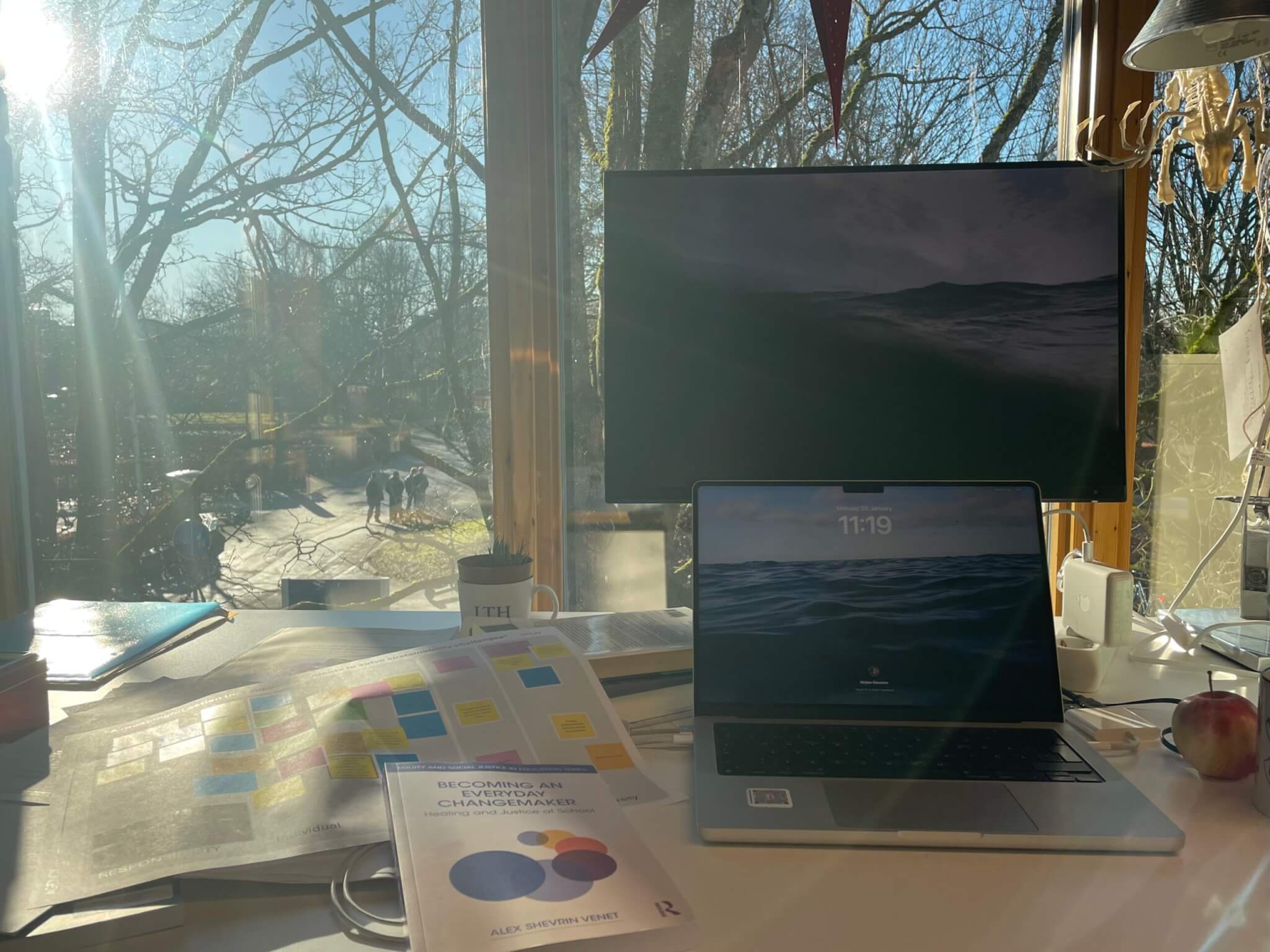
The process is the point.
I picked up my copy of Venet (2024)’s “Becoming an Everyday Changemaker: Healing and Justice at School” this morning and I loved the book before I even started reading the introduction, because one sentence in the acknowledgements (that I was going to skip) caught my eye: “writing from bed is a time-honored […] way of being an activist and cultural worker”. You have no idea how much of this blog has been written from my bed, including this blog post, and somehow reading this feels so very validating.
I haven’t gotten very far in the book yet, but then this afternoon, I virtually attended Anne-Kathrin Peters’ docent lecture at KTH on “Technology and Engineering Education in Turbulent Times“, and these two impression just make so much sense together.
An important message of the book is that “the process is the point”. When we do change work, in this case on justice, but also more generally, it does not only matter what the outcome is, it also matters how we get there. We need shared ownership of the process AND of the outcome. That is the difference between deciding that we need to work in strong teams and in the process destroying existing strong working relationships in order to restructure, vs adding new, equally strong relationships to the existing ones during the process. As Venet writes, “we must ensure that we ground our changemaking in those same principles [that lead us to work for a certain outcome] to truly live into our values”.
Anne, in her lecture, made a very similar point. In education, we do not only prepare people for the future, we also make future every day. And she argues for “radical futurity”: openness to all possible futures. The future does not yet exist, it hasn’t even been imagined yet. This is the apparent paradox of sustainability: While working for sustainability, we need to understand sustainability as emergent. We cannot define it, instead we need to invite everybody into the process to figure out what it can be. The process is the point, and we need to do the process in a way that aligns with the desired outcome.
And, as Anne explained, a part of that is that the emotional connection to the topic that is being modelled, and that students take on vicariously, needs to come from teacher, not from some expert guest, because “you really need to learn this, but I couldn’t be bothered, so I am bringing in someone else so I don’t have to engage with the topic myself” is really not the message to send. (Neither is, btw, “I am a nerd. I love programming. Does society need it? Who cares, I love it! And I will spend every waking minute fighting this computer until I have figured out this problem“. While this a very emotional, very relational message that students do respond well to, but it is also modelling a domination approach to technology that has gotten us into the mess we are in in the first place).
In the book, speaking about equity, justice, and healing, Venet writes “we may not find a single, clear answer to the contradictions of change, but by focussing on the process, we can find a path forward”. And Anne discusses that if we add sustainability to an existing curriculum, what does that make the rest in the curriculum? The rest is NOT neutral. Is it then “unsustainability”? Imagine exploring the possibilities of all moments of education, through focus on the process, not only the outcome!
Venet writes that change takes a long time, and recommends that “rather than trying to box change up into discrete steps or a checklist, we have to lean into the messiness of change”. And that is also what I understood Anne’s call to action to be, too, to reflect on what is important for education today, and together consider our role in shaping and developing education in these turbulent times. I don’t know how many people were physically in the room for her lecture, but I saw that 47 accounts were connected online, and here in Lund, we had a “public viewing” with four colleagues (and interesting discussions afterwards). I hope many of them follow this call, and focus on the process. The process is the point.
Venet, A. S. (2024). Becoming an Everyday Changemaker: Healing and Justice at School. Taylor & Francis.
“Addressing students’ eco-anxiety when teaching sustainability in higher education”, inspired by Eriksson et al. (2022) – Teaching for Sustainability says:
[…] felt like it would be good to give actionable advice here. But then at some point I realised that the process is the point (yes, I need to keep reminding myself of that), so you’ll just get what I can write right now, […]
It is not up to us to complete the work, but neither are we free to desist from it - Adventures in Oceanography and Teaching says:
[…] an Everyday Changemaker: Healing and Justice in School” (where I understood that “the process is the point“, and where then helpful tools like “Vent diagrams” were introduced). Now, […]
Podcast recommendation: The Broken Copier! - Adventures in Oceanography and Teaching says:
[…] “the process is the point” was, at some point, planned as the title of the book! To me, understanding that “the process is the point” was really a lightbulb moment, that it is really about HOW change happens and not just that, so it is funny to learn that it was […]
Currently reading Venet (2024)'s "Becoming an Everyday Changemaker: Healing and Justice at School" - Adventures in Oceanography and Teaching says:
[…] and Justice at School” (online access for LU!). I first wrote about the first couple of pages here. In a nutshell, my main take-away then was that “the process is the point”. We cannot […]